In July 2007 in Afghanistan, 23 South Korean Christian missionaries were captured and held hostage by Taliban terrorists, who demanded a hefty ransom, the withdrawal of Korean troops from Afghanistan and the release of their imprisoned fighters.
The whole debacle embroiled Korea in sleepless soul-searching and do-or-die dickering spanning six weeks. The National Security Council at Cheong Wa Dae was summoned, and eventually a reported $20 million was paid to free 21 survivors following the assassination of two men.
Unbeknownst to many, the tragic misadventure’s resolution was made possible by the International Committee of the Red Cross, whose frontline workers arranged the initial meeting of negotiators from both sides.
The ICRC was able to undertake the role because it had won the trust of different stakeholders based on its long-term engagement in Afghanistan promoting neutrality and confidentiality, said Gianni Volpin, Head of the ICRC mission in Korea, in an interview with The Korea Herald last week.
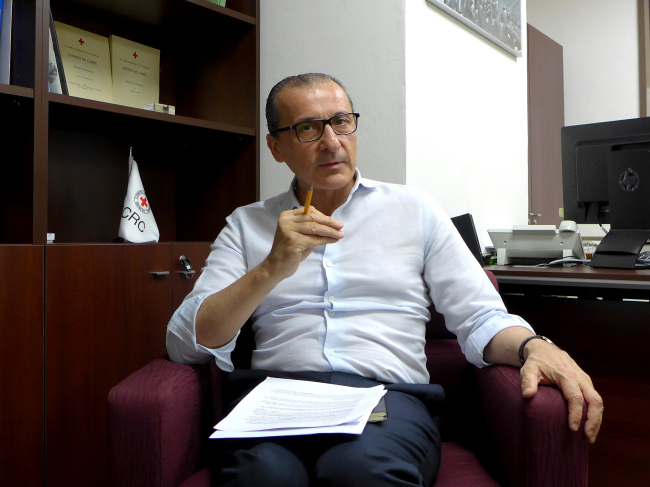 |
Gianni Volpin, Head of the International Committee of the Red Cross mission in Korea (Joel Lee / The Korea Herald) |
Commemorating the International Day of the Disappeared this Tuesday, the Italian humanitarian worker urged everyone to pay heed to the plight of people around the world, as tens of thousands of individuals have vanished through wars and conflicts.
“This day is becoming more significant than ever, because the number of missing persons has constantly risen from escalating conflicts worldwide,” he stressed. “Conflicts are being protracted and expanding across national borders, spilling over into sub-regions and regions. They are also fragmented with slews of armed groups battling against each other and government.”
This has complicated matters for the ICRC -- the world’s oldest humanitarian organization, established in 1863 in Geneva, Switzerland, with four Nobel Peace Prize laureates -- as it strives to help relieve the pain and suffering of the families who have lost loved ones.
At the family’s request, the ICRC starts ferreting out clues about the victims, rummaging through refugee camps, detention centers, hospitals, morgues and cemeteries. The committee collaborates with authorities for detailed information; compiles data, often using forensic evidence with an internal team of specialists; and provides psychological, social, economic, legal and administrative aid to the families.
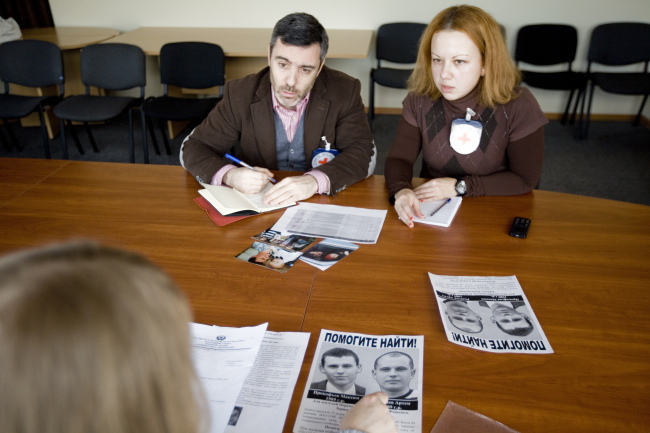 |
Two ICRC employees interview a relative of a missing person in Ukraine. (The International Committee of the Red Cross) |
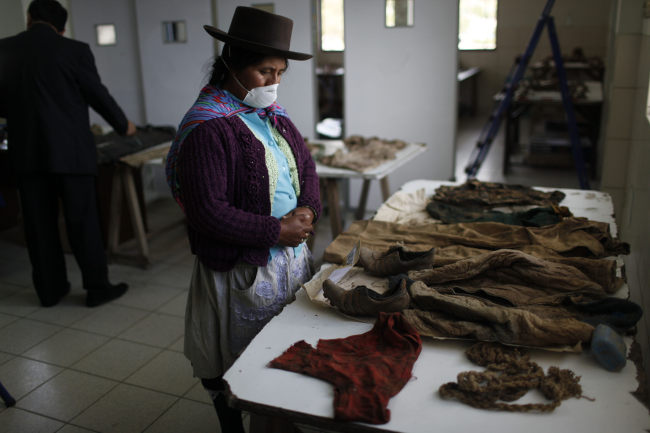 |
A woman looks at clothes of a missing family member that were brought by the ICRC in Peru. (The International Committee of the Red Cross) |
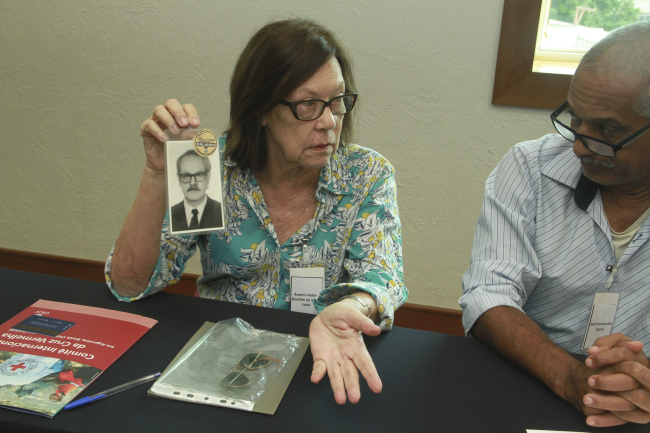 |
A woman shows a photo of her father who disappeared during a period of military dictatorship (1964-85) in Brazil. (The International Committee of the Red Cross) |
Currently, the organization handles over 60,000 cases in some 80 countries, “a tip of the iceberg” of people still unaccounted for around the globe. There are over 20,000 of them in the Balkans, 68,000 in Colombia, 16,000 in Sri Lanka and 13,000 in Peru. Last year alone, more than 17,000 requests to investigate someone’s whereabouts were submitted to the ICRC.
With international relations becoming ever more hostile and carnage engulfing the Middle East, Africa, Latin America, South Asia and Southeast Asia, over 40 million people have been displaced within their countries and 21 million have become refugees. This makes the total number of forcibly displaced persons worldwide over 65 million.
Through treacherous journeys across the Mediterranean from the Middle East and Africa -- particularly Syria, Libya, Iraq and Yemen and South Sudan, Central African Republic and the region surrounding Lake Chad -- many people die or disappear as refugees and migrants, Volpin underlined. Both civilians and combatants go missing during hostilities, he noted, adding the majority of cases occurs from kidnapping, summary execution and massacre.
“Unlike in the past, conflicts are fought more and more in densely populated urban areas, placing high tolls on victims,” he pointed out. “In contemporary warfare, we increasingly witness widespread disrespect of basic rules and norms of conduct by combatants.”
In many conflict zones, people are forcibly recruited into armed groups, and many women and girls are exploited as sexual slaves, the aid worker highlighted. Another characteristic of modern guerilla warfare is that terrorist organizations such as ISIS and Boko Haram actively publicize their savagery on the internet and social media to attract followers and gain legitimation.
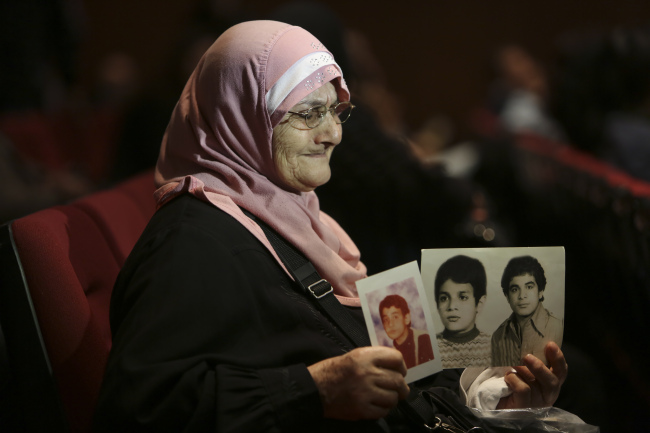 |
A mother holds up photographs of her children who vanished during the Lebanese civil war from 1975 to 1990, which killed more than 250,000 people. (The International Committee of the Red Cross) |
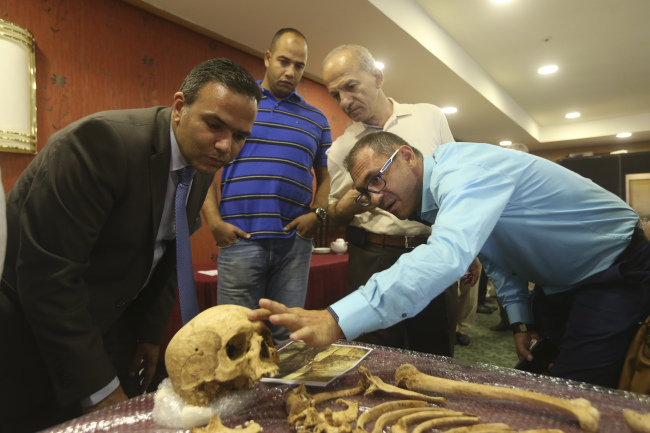 |
A forensic scientist, prosecutor, scholar and archaeologist team up for joint investigation into disappeared citizens in Lebanon. (The International Committee of the Red Cross) |
 |
An ICRC staff pays a visit to a prison to relay messages from the detainees’ families. (The International Committee of the Red Cross) |
The pain is inflicted on not just those missing, but their families, who must carry on in grief, anguish and frustration, explained Volpin, based on his missions in Rwanda, Azerbaijan, Kosovo, Bosnia, Angola, Burundi, Ethiopia, Liberia, South Sudan and Senegal. These are “hidden tragedies,” he said, adding families bear the brunt of financial difficulties from losing a breadwinner as well as bureaucratic hurdles, such as attaining the legal status of the lost.
The role of the Seoul office is to garner assistance and interest from the Korean government, academia, media and public on its activities around the world. It disseminates information to the military, police and research institutions.
“We hope that Korea can play a bigger role in international humanitarian issues, not just through the government, but also the public joining our institution and participating in our operations abroad,” Volpin said. The Seoul mission is in the process of negotiation with the Korean Ministry of Foreign Affairs to attain legal status as a humanitarian agency.
The ICRC has served in North Korea since 2002, offering physical rehabilitation and related orthopedic medical services in partnership with the Democratic People’s Republic of Korea Red Cross Society and relevant state departments. Based in Pyongyang, it operates across hospitals in Hamhung, Pyongsong, Sariwon and Kaesong, with 10 international and 12 national employees.
The agency works with the United Nations on the ground and institutional level, protecting civilians, exchanging prisoners and separated families and guaranteeing access to medical services, food, water and emergency items.
The two institutions issued a joint statement on the impact of today’s conflicts on civilians last year and appealed for concrete action to mitigate sufferings. Unlike the UN, which is influenced by member states’ prerogatives, the ICRC can uphold and promote international humanitarian laws impartially and independently, Volpin emphasized.
By Joel Lee (
joel@heraldcorp.com)
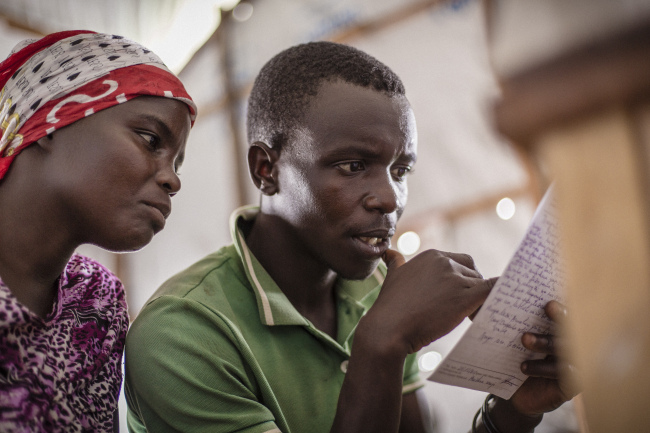 |
Burundian refugees in Congo read messages sent from their families in Burundi with the help of ICRC. (The International Committee of the Red Cross) |
 |
An ICRC worker consoles a family member of a missing migrant in El Salvador. (The International Committee of the Red Cross) |
















